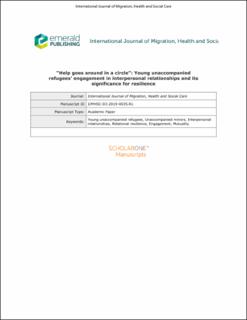“Help goes around in a circle”: young unaccompanied refugees’ engagement in interpersonal relationships and its significance for resilience
Peer reviewed, Journal article
Accepted version

Date
2019-11Metadata
Show full item recordCollections
Original version
Johansen, K., Studsrød, I. (2019) “Help goes around in a circle”: young unaccompanied refugees’ engagement in interpersonal relationships and its significance for resilience, International Journal of Migration, Health and Social Care, 15(4), pp. 249-261. https://doi.org/10.1108/IJMHSC-03-2019-0035Abstract
Abstract Purpose The purpose of this paper is to address how young unaccompanied refugees in Norway actively engage in interpersonal relationships. It explores the significance of these relationships in doing well following adversity, according to the young people’s own perspectives. Design/methodology/approach This study is based on a qualitative research design. Data were derived through a combination of participant observation, interviews and research workshops inspired by participatory methods. In total, 12 young unaccompanied refugees, aged 15–20, residing in Norway, participated in the study. Findings Participants described actively searching for help and support in order to do well. In addition, they showed concern for others and often described an explicit intention of helping. They engaged in relationships of mutual support and helped others through acts of kindness or social involvement. Nevertheless, the relationships were not only a source of happiness, safety and well-being, but also of pain and worry. Practical implications Social workers who want to strengthen the resilience of young unaccompanied refugees should consider and build on the young people’s capacity for involvement and mutual support. Originality/value This study offers a unique analysis of young unaccompanied refugees’ engagement in relationships and the significance of these relationships in doing well following adversity.